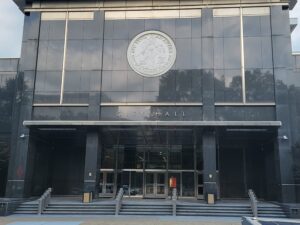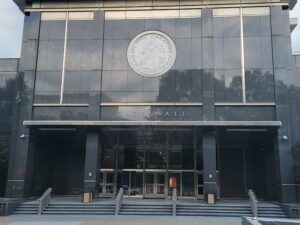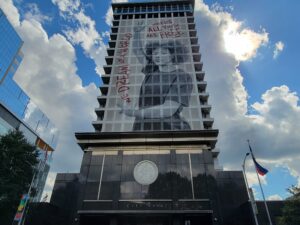Current student uses her teaching background to support financial literacy movement through her internship with the City of Richmond’s Treasure’s Office

This post was written by current student Jennifer Taylor-Monteagudo.
As a City of Richmond Mayor’s Fellow, I have had the opportunity to learn the how many of the UNC MPA courses correlate in a government entity. My internship in the Treasurer’s Office, an elected official, has enhanced my connection to various stakeholders. The unique opportunity has allowed me to work with city residents on the phone, in person, and via social media platforms. The ability to work with elected officials, residents, and city public servants has made knowledge of the organizational structure and effective communication key skills to successfully working with stakeholders at multiple levels within the city.
During the internship I have been afforded the opportunity to work on a variety of projects and efforts by the Treasurer’s Office including the Office of Financial Empowerment and Financial Wellness Wednesday. I have also had exposure to internal processes and how various departments interact to provide select services to residents of Richmond. The Freedom of Information Act (FOIA) requests process was of particular interest as governments in general are not known for efficient use of time and these requests are time sensitive. Understanding how the departments work together to obtain requested documents and remain in compliance with the required timeframe for a response has been a valuable lesson on developing and maintaining positive work relationships.
The primary focus of my internship is on assisting with the Office of Financial Empowerment through the Office of the City Treasurer. The Office of Financial Empowerment has a mission to “inspire, encourage, and pursue the high possibilities of potential in others through elimination of financial barriers by “Making Options and Resources Easily Accessible” for all. The office does this by incorporating financial coaching services, providing and promoting financial literacy throughout the city, and partnering with City Agencies to improve service to city residents facing poverty and COVID-19 related financial distress. This aspect of my internship has provided me with exposure on the intricacies of developing an idea to an action within the confines of the government. Aligning the needs of the community with the resources allocated to the department. I have been fortunate to see the partnering of multiple departments that have shared interests in the financial status of residents, combine their separate resources to make a larger impact to better the community.
I was able to contribute towards the creation of financial tools that assist residents in learning to create and execute a budget. In addition I am able to create graphics that are aesthetically appealing to the public but also provide information and resources on how to become more financially empowered. These graphics are posted on social media regularly allowing an element of creativity while maintaining a consciousness of targeted audience. I was also able to use my teaching background to support the brainstorming on how to present and teach financial literacy to city residents. This opportunity allowed for my expertise to bring value and make the development thoughtful to the variety of adult learning styles within the city of Richmond.
So far in this internship experience as a City of Richmond Mayor’s Fellow, I have learned the importance of leadership and how it impacts outcomes for city employees and residents. As I progress through this fellowship, relationships has been a reoccurring theme. The building and development of strong relationships with all City Of Richmond stakeholders has been integral in the success of programs across multiple departments. Understanding the organizational structure and respecting that structure is important in acknowledging and building relationships and getting things accomplished. I am excited to continue to acquire knowledge and connections between the UNC MPA program and the reality of local public service.
